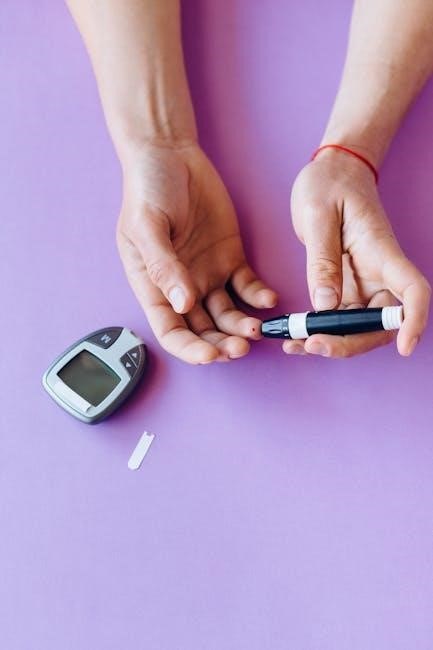
Polycystic Ovary Syndrome (PCOS) is a hormonal disorder affecting millions of women, often causing weight gain, insulin resistance, and irregular cycles. Diet plays a crucial role in managing symptoms, balancing hormones, and improving overall health. A well-structured 7-day PCOS diet plan can help stabilize blood sugar, reduce inflammation, and promote sustainable weight management, offering a roadmap to long-term wellness.
Understanding PCOS and Its Impact on Health
PCOS is a hormonal disorder affecting 5-10% of women, causing irregular cycles, weight gain, and insulin resistance. It leads to hormonal imbalances, cysts on ovaries, and metabolic issues. Untreated, PCOS increases risks of diabetes, cardiovascular disease, and infertility. While there’s no cure, diet and lifestyle changes can manage symptoms, improving insulin sensitivity and hormone balance. Understanding PCOS is key to addressing its wide-ranging health impacts and adopting strategies for long-term wellness.
How Nutrition Plays a Key Role in Managing PCOS Symptoms
Nutrition is a cornerstone in managing PCOS symptoms, as it directly impacts hormonal balance and insulin sensitivity. A tailored diet helps stabilize blood sugar levels, reducing inflammation and promoting weight management. By focusing on whole, nutrient-dense foods like lean proteins, healthy fats, and fiber-rich vegetables, women with PCOS can improve metabolic health. Avoiding processed carbs and sugary foods is essential to mitigate insulin resistance, a common issue in PCOS. A well-designed diet not only alleviates symptoms but also supports long-term hormonal and reproductive health, making it a powerful tool for overall wellness.

Overview of the 7-Day PCOS Diet Plan
A structured 7-day meal plan designed to manage PCOS symptoms by balancing blood sugar, improving insulin sensitivity, and promoting weight management through nutrient-rich, anti-inflammatory foods.
Benefits of a Structured Meal Plan for PCOS
A structured 7-day meal plan offers numerous benefits for PCOS management, including blood sugar stabilization, improved insulin sensitivity, and weight management. It helps reduce inflammation, boosts energy levels, and supports hormonal balance. By focusing on nutrient-dense, anti-inflammatory foods, the plan promotes long-term health and sustainability. It also provides clarity and reduces decision fatigue, making it easier to stick to a healthy diet. This approach is not about restriction but about nourishing the body to alleviate symptoms and enhance overall well-being.
Key Principles of the PCOS Diet
The PCOS diet focuses on balancing hormones and managing insulin resistance. It emphasizes whole, unprocessed foods like vegetables, lean proteins, and healthy fats. Low-carb options are encouraged to control blood sugar spikes, while fiber-rich foods aid digestion. Hydration and portion control are also key. Avoiding sugary, refined, and processed foods is crucial. The diet promotes anti-inflammatory ingredients and mindful eating. By adhering to these principles, individuals can improve symptoms, enhance fertility, and maintain a healthy weight long-term.
Day-by-Day Meal Plan
This structured 7-day plan offers balanced and nutritious meals, focusing on protein, fiber, whole grains, and healthy fats, ensuring variety and sustainability throughout the week.
Day 1: Balanced Breakfast, Nutritious Lunch, and Healthy Dinner
Start your day with a veggie frittata and whole wheat toast topped with mashed avocado for a protein-packed breakfast. Lunch features a Taylor Farms Chopped Salad Kit with rotisserie chicken and a small apple, providing fiber and lean protein. Dinner includes grilled salmon, quinoa, and steamed broccoli, offering omega-3 fatty acids and antioxidants. This balanced approach ensures a nutrient-dense start to your week, promoting hormonal balance and energy stability. Incorporate healthy fats like avocado and olive oil to support overall wellness and satisfaction.
Day 2: Incorporating Protein and Fiber
Begin with Greek yogurt topped with fresh berries, almonds, and a drizzle of honey for a high-protein breakfast. Lunch includes a mixed green salad with grilled chicken, cucumber, cherry tomatoes, and a light vinaigrette. Dinner features roasted chicken breast, sweet potato, and steamed green beans. Snacks like hard-boiled eggs or a small apple with peanut butter keep energy levels steady. This day focuses on lean proteins and fiber-rich foods to support satiety, digestion, and blood sugar balance, key for managing PCOS symptoms effectively.
Day 3: Focus on Whole Grains and Vegetables
Start Day 3 with whole grain oatmeal topped with chia seeds, blueberries, and a drizzle of honey. Lunch features a quinoa salad with roasted vegetables like zucchini, bell peppers, and red onions, dressed with lemon-tahini vinaigrette. Dinner includes stuffed bell peppers filled with brown rice, ground turkey, spinach, and diced tomatoes. Snacks like carrot sticks with hummus or a handful of mixed nuts are encouraged. This day emphasizes whole grains and vegetables to provide sustained energy, fiber, and essential nutrients, supporting hormone balance and overall well-being.
Day 4: Healthy Fats and Omega-3 Rich Foods
Begin Day 4 with avocado toast on whole grain bread, topped with a poached egg and a side of mixed berries. Lunch features a salmon salad with mixed greens, cherry tomatoes, cucumber, and olive oil vinaigrette. Snacks include a handful of almonds and walnuts. Dinner consists of grilled chicken with flaxseeds, roasted sweet potatoes, and steamed green beans. This day highlights the importance of healthy fats and Omega-3s for hormone balance, inflammation reduction, and improved metabolic function.
Day 5: Low-Carb and High-Protein Options
Start Day 5 with scrambled eggs, spinach, and feta cheese, served with a side of cucumber slices and cherry tomatoes. Lunch features grilled chicken breast with roasted broccoli and a side salad. Snack on Greek yogurt with berries. Dinner includes baked cod with cauliflower rice and sautéed asparagus. This day emphasizes low-carb, high-protein meals to help regulate blood sugar, improve insulin sensitivity, and support weight management, while keeping energy levels steady and hunger in check.
Day 6: Detox and Anti-Inflammatory Foods
Begin with a green smoothie containing spinach, avocado, and chia seeds for breakfast. Lunch includes a mixed green salad with grilled chicken, cherry tomatoes, and a lemon-turmeric dressing. Snack on a handful of berries with almonds. Dinner features baked salmon with steamed asparagus and a side of quinoa. This day focuses on anti-inflammatory and detoxifying foods to reduce inflammation, promote hormonal balance, and support overall well-being, helping to alleviate PCOS symptoms naturally and effectively.
Day 7: Maintenance and Long-Term Sustainability
Start with a spinach and feta omelette for breakfast, followed by a mixed greens salad with grilled chicken and a balsamic vinaigrette for lunch. Snack on sliced cucumbers with hummus. Dinner includes roasted turkey breast with steamed broccoli and cauliflower rice. Focus on portion control and hydration. Incorporate physical activity, like a 30-minute walk, to maintain momentum. Emphasize consistency and gradual changes for long-term success, ensuring the diet becomes a sustainable lifestyle rather than a short-term fix.

Grocery List and Recipes
Stock up on lean proteins, whole grains, vegetables, and healthy fats. Include avocado, eggs, and omega-3 rich foods. Download the free PDF for detailed recipes and shopping lists.
Essential Foods to Include in Your Grocery List
Focus on whole grains like quinoa and brown rice, lean proteins such as chicken and fish, and healthy fats like avocado and olive oil. Incorporate colorful vegetables, berries, and omega-3 rich foods like salmon. Don’t forget eggs, Greek yogurt, and nuts for added nutrition. These foods help stabilize blood sugar, reduce inflammation, and support hormonal balance. Download the free 7-day PCOS diet plan PDF for a detailed shopping list tailored to your needs.
Quick and Easy PCOS-Friendly Recipes
Start your day with a veggie frittata or avocado toast for a nutrient-packed breakfast. For lunch, try a hearty salad with grilled chicken or a Mediterranean-inspired wrap. Dinner ideas include baked salmon with steamed vegetables or a stir-fry with lean beef and brown rice. These recipes are designed to balance blood sugar, reduce inflammation, and support hormonal balance. Find these and more delicious, easy-to-make options in your free 7-day PCOS diet plan PDF for a comprehensive guide to nourishing meals.
Meal Prep Tips for Busy Schedules
Meal prepping is essential for maintaining consistency with your PCOS diet plan, even on busy days. Start by planning your meals for the week and creating a detailed shopping list. Chop vegetables, cook proteins, and portion out meals in advance to save time. Use reusable containers to store prepped meals and snacks, ensuring they stay fresh. Batch cooking and leftovers can also simplify your routine. These strategies help you stay on track with your PCOS-friendly diet while fitting into your hectic lifestyle.
Importance of Nutrition in PCOS Management
Nutrition is a cornerstone in managing PCOS, as it helps balance hormones, improve insulin sensitivity, and reduce inflammation. A tailored diet can significantly alleviate symptoms and promote overall health.
Food as Medicine: How Diet Impacts Hormones
Diet plays a vital role in regulating hormones, particularly for women with PCOS. Certain foods can influence insulin levels, androgen production, and inflammation, all of which are closely linked to PCOS symptoms. Eating anti-inflammatory and whole foods helps stabilize blood sugar, reduce insulin resistance, and lower androgen levels. A balanced intake of protein, healthy fats, and complex carbohydrates supports hormonal equilibrium, while avoiding processed foods and refined sugars further aids in managing symptoms. This approach underscores the concept of food as medicine, promoting long-term hormonal balance and well-being.
Managing Insulin Resistance Through Diet
Diet is a cornerstone in managing insulin resistance, a common issue in PCOS. A low-carb, high-protein diet can help stabilize blood sugar levels and improve insulin sensitivity. Incorporating healthy fats, such as avocados and Omega-3 rich foods, further supports metabolic health. Avoiding refined sugars and processed foods reduces insulin spikes, aiding in weight management and hormonal balance. By focusing on whole, nutrient-dense foods, individuals with PCOS can effectively manage insulin resistance, promoting long-term health and reducing symptom severity.

Lifestyle Tips Beyond Diet
Beyond diet, regular exercise, stress management, and adequate sleep are vital for PCOS management. These habits complement dietary changes, promoting hormonal balance and overall well-being effectively.
Exercise Routines to Complement the Diet Plan
Regular physical activity is essential for PCOS management. A combination of cardio, strength training, and flexibility exercises can improve insulin sensitivity, promote weight loss, and enhance hormonal balance. Aim for at least 150 minutes of moderate-intensity aerobic exercises, such as brisk walking or cycling, weekly. Incorporate strength training twice a week to build muscle and boost metabolism. Additionally, activities like yoga or Pilates can reduce stress and improve overall well-being, complementing the benefits of a structured PCOS diet plan.
Stress Management Techniques for PCOS
Stress management is crucial for PCOS as it helps reduce cortisol levels, improving hormonal balance and alleviating symptoms. Techniques such as mindfulness meditation, yoga, and deep breathing exercises can effectively lower stress hormones and enhance overall well-being. Regular physical activity, like brisk walking or cycling, not only reduces stress but also improves mood and energy levels. Additionally, prioritizing quality sleep and incorporating relaxation methods into daily routines are essential for managing stress effectively in women with PCOS.

Common Mistakes to Avoid
Common mistakes include restrictive dieting, overconsumption of processed foods, and neglecting portion control. Avoiding these pitfalls ensures better adherence to the 7-day PCOS diet plan.
pitfalls in PCOS Nutrition and How to Avoid Them
Pitfalls in PCOS Nutrition and How to Avoid Them
Common pitfalls in PCOS nutrition include restrictive dieting, overconsumption of processed foods, and neglecting portion control. To avoid these, focus on balanced eating, emphasizing whole foods like vegetables, lean proteins, and whole grains. Avoid extreme calorie restriction, as it can worsen hormonal imbalances. Stay hydrated and limit sugary drinks. Mindful eating and regular meal times can help prevent overeating. Prioritize nutrient-dense foods over processed options to support hormonal balance and weight management. A structured 7-day PCOS diet plan can guide healthy choices and long-term sustainability.
A 7-day PCOS diet plan offers a structured approach to managing symptoms, promoting hormonal balance, and fostering long-term healthy habits for overall wellness and sustainability.
Long-Term Sustainability and Healthy Habits
Adopting a sustainable approach to nutrition is key for managing PCOS long-term. A balanced diet focused on whole foods, lean proteins, and healthy fats helps maintain hormonal balance and energy levels. Incorporating meal prep and hydration routines ensures consistency, while gradual lifestyle changes promote lasting results. Viewing food as medicine and embracing mindful eating habits fosters a healthier relationship with nutrition, empowering individuals to thrive beyond a 7-day plan and achieve long-term wellness.